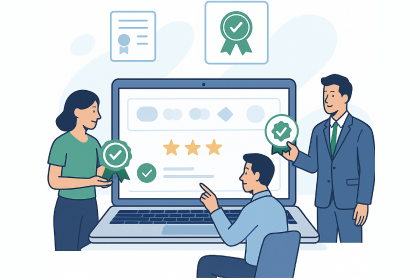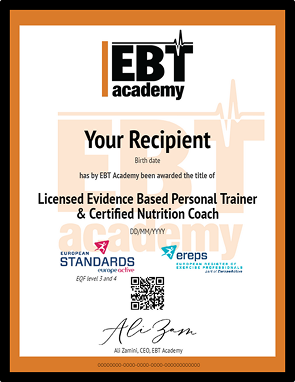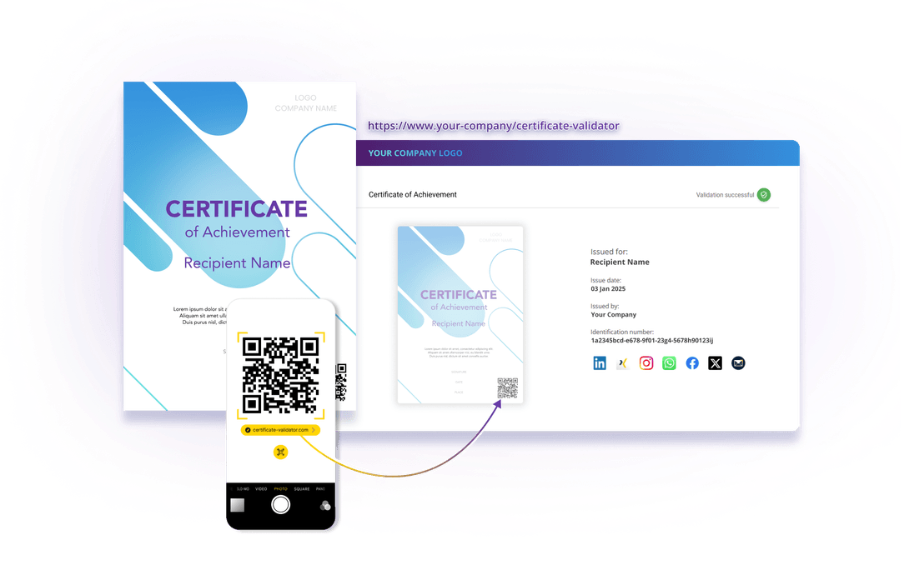No user accounts required for your recipients -
Existing certificates and badges always stay valid


Build Trust and Credibility with Social Proof Strategies in B2B Marketing



Trust is not just a nice addition in B2B marketing. It is often the deciding factor when organizations evaluate new solutions. Education providers like first aid centers or universities typically manage sensitive learner data and must ensure that any technology they adopt strengthens, rather than risks, their reputation.
Imagine a university preparing to digitize thousands of certificates each year. Their brand is on every document. Any mistake or security flaw could undermine the trust students and employers place in them. That is why they look carefully at vendors’ track records before signing a contract.
In B2B, purchases often involve larger budgets, longer commitments and multiple people signing off. This makes trust a cornerstone of your entire sales process. It is also the reason why social proof plays such an essential role in convincing prospects that they are making a safe decision.
When decision-makers at universities or training centers evaluate new platforms, they rarely rely on vendor promises alone. Instead, they look for evidence that others like them already trust and benefit from your solution. This is exactly what social proof delivers.
The concept comes from psychology. People naturally follow the choices of others, especially when faced with uncertainty. In B2B marketing, social proof helps reduce doubts by showing that respected organizations have already chosen your service.
For example:
In short: social proof in B2B is not about hype. It is about giving prospects the reassurance they need to make a well-founded decision.
Not all social proof looks the same. In B2B marketing, certain types are especially effective because they speak directly to the rational and risk-aware mindset of business buyers. Here are the key forms you should focus on:
A simple row of client logos on your website can send a strong message: other respected institutions trust you. This makes it easier for new prospects to imagine themselves working with your company.
Short quotes from satisfied customers, ideally with name, title and organization, add a human voice to your claims. For example, a testimonial from a head of continuing education about how digital certificates simplified their process is highly convincing.
Detailed success stories go a step further. They show exactly how your platform helped a specific client achieve measurable goals, such as increasing course participation or streamlining certificate delivery. This makes your marketing promises tangible.
Independent platforms like G2 provide neutral assessments. B2B buyers often consult these sites before contacting a vendor. Positive reviews here give your reputation an extra layer of credibility.
Facts like “over 1 million certificates issued each year” or “trusted by more than 500 education providers” are powerful trust signals. They show at a glance that many organizations rely on your expertise.
Even the strongest social proof is wasted if your audience never sees it. In B2B marketing, it is essential to position trust signals where they support buying decisions most effectively.
Your homepage, product pages and pricing or contact sections are prime locations. Buyers often visit these pages before reaching out.
When your sales team pitches to decision-makers, social proof helps justify the investment.
Follow-ups after webinars or discovery calls are more convincing with trust signals.
B2B audiences often do research on LinkedIn. Seeing your clients share their badges or case studies builds indirect trust.
Not all social proof works equally well. In B2B marketing, buyers are cautious and want credible, relevant examples.
Keep It Authentic
Avoid generic phrases like “Our clients love us.” Instead, use real names, titles and organizations. If possible, link to a detailed case study or verified review.
Make It Relevant
Highlight customers that are similar to your prospects.
Always Get Approvals
Ensure that clients have explicitly agreed to public use of their logos, quotes or stories. This protects both your brand and your relationships.
Combine Text with Visuals
A testimonial is stronger with a photo, a case study is more persuasive with screenshots of the actual certificates or badges issued.

This is where your solution at Virtualbadge.io truly shines. Digital certificates and badges are not just a way to certify learning. They act as living, shareable trust signals.
🎓 Participants Share Achievements
When learners post their new certificates or badges on LinkedIn, it indirectly promotes your institution or program.
Example: “Anna from ABC University just shared her certified first aid badge with 500+ connections.”
🔗 Verification Pages Build Extra Credibility
Each certificate comes with a secure verification page. When employers or partners check it, they see a consistent, professional presentation that reinforces your brand’s authority.

In B2B marketing, this is powerful social proof: it shows that other organizations already trust you to certify their learners, while spreading your reputation across professional networks.
🎯 Ready to strengthen your own social proof?
Discover how digital certificates and badges from Virtualbadge.io can help you build trust and expand your reach.
👉 Schedule a free demo today and see how easy it is to turn your certificates into powerful marketing assets.
* You can find the organisation ID in the URL when you access your LinkedIn Company page as an admin.


Marketing
Jul 18, 2025
5
Use Virtualbadge.io to design and send digital certificates that create trust - in less than 10 minutes.